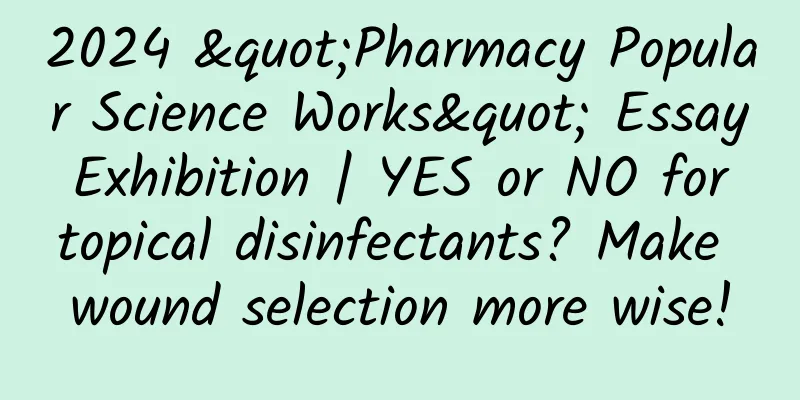2024 "Pharmacy Popular Science Works" Essay Exhibition | YES or NO for topical disinfectants? Make wound selection more wise!

|
Those little bumps and bruises in life are like uninvited mischief, always causing some harm to our bodies inadvertently. If the wound is not treated properly, it may leave scars and become a "mark of history". What's worse is that it may become an invisible killer of health! When treating wounds, facing the "big names" in the disinfectant industry: iodine, iodine, alcohol, hydrogen peroxide... do you also feel a little confused? Today, let Yaowa take you into the wonderful world of disinfectants and learn how to use these "little friends" correctly. Povidone-iodine, also known as povidone-iodine solution, can be described as the "number one seed player" for household wound disinfectants. It is gentle and efficient, and can form a protective film on the wound surface, making it difficult for bacteria and dust to invade the wound again, making it suitable for disinfecting various wounds. Whether it is a knife wound, abrasion, burn, or frostbite, it can handle it with ease. Povidone-iodine is less irritating and the pain is less when wiping, but friends who are allergic to iodine or have a large burn area should avoid it. Don't let it be used on the body for a long time, otherwise the skin will "get angry" and symptoms such as rough skin and pigmentation will appear. In addition, it has poor stability and does not like sunlight, so it must be placed in a cool place. Iodine tincture, also known as "iodine wine", is a "tough guy" in the disinfection industry. With its 2% iodine content, it can quickly kill bacteria, fungi and other pathogenic microorganisms, making it a tough guy. It can be applied to general skin infections such as folliculitis, small boils before they mature, or local bites by poisonous insects. However, its irritation and corrosiveness should not be underestimated. Do not use it on delicate areas such as the eyes and oral mucosa, nor on broken wounds, and do not let it show off in "sensitive areas" such as the face and perineum. It should be noted that after using iodine tincture to disinfect the skin, it must be "bathed" as soon as possible, that is, wipe it with alcohol to remove iodine to reduce the irritation of iodine to the skin. Iodine tincture also needs to be stored in a cool place. Ethanol is the alcohol we are familiar with. It can dehydrate by coagulating microbial proteins, thus exerting a disinfecting effect. This ancient disinfection star still has important value today. But please note that 75% alcohol is the best ratio, and don't blindly pursue high concentrations. In addition, people who are allergic to alcohol should use it with caution. Alcohol is not suitable for disinfection of mucous membranes and large wounds because it is highly irritating, easy to evaporate, and the effect is not long-lasting. Also, don't use the white wine at home to replace it, because other ingredients in the white wine may "play ambiguously" with bacteria! Hydrogen peroxide, also known as hydrogen peroxide, is a brave "foam warrior". It can quickly produce bubbles (i.e. active oxygen), penetrate into the cell wall of bacteria and the shell of viruses, oxidize and denature the bacteria or shell protein and cause death, help remove pus, blood clots and necrotic tissue, and form "white scab". 1% concentration of hydrogen peroxide is often used for suppurative otitis externa and otitis media, stomatitis, gingival pyorrhea, tonsillitis and cleaning wounds. Use 3% solution for flushing or wet compress, which is especially suitable for wounds infected by anaerobic bacteria, tetanus and gas gangrene. However, you must pay attention to the concentration and method of use when using it, otherwise the skin wound will "cry"! Benzalkonium bromide, also known as Sanisol. This low-key friend, although it is usually silent, is a powerful one! It can not only inhibit bacterial growth, but also destroy the cell structure of bacteria, causing cell dissolution and death. Because the concentration of commercially available benzalkonium bromide solution is 5%, it should be diluted before use and prepared for immediate use. This friend is very particular about the choice of concentration. Use 0.1% solution for skin disinfection and 0.01% solution for wound mucosal disinfection to ensure that no additional burden is imposed on the wound while disinfecting. Be careful not to let it come into contact with soap, tincture of iodine, potassium permanganate, hydrogen peroxide solution, etc., otherwise it may "go on strike" and lose its original disinfection effect! Mercurochrome and gentian violet, these two antique medicines, were once the childhood memories of many people. But they are out of date and have been eliminated by modern medicine! Mercurochrome contains heavy metal mercury, and gentian violet is a carcinogen. So, quickly find them out of your home and throw them away! The right topical disinfectant can be a "magic weapon", but the wrong one can be a "deadly weapon". Choose one disinfectant each time you clean a wound, and never mix them. |
<<: "Medicine" is not allowed | Do not sunbathe while taking doxycycline
>>: How many of these 6 drugs with different specifications and indications do you know?
Recommend
What to do if the leaves of kumquat are moldy? How to care for kumquats to grow vigorously
Kumquat is a kind of fruit that we often see in o...
Can I eat spicy food when I am pregnant?
You can eat spicy chips during pregnancy, but you...
What kind of fruit is Australian mandarin? Nutritional analysis of Australian mandarin
In addition to being eaten fresh, citrus fruits a...
What to do if the vaginal opening is white
In daily life, many female friends may have encou...
What to do about menopausal depression
Menopausal depression can have a great impact and...
What are the symptoms of high progesterone?
The level of progesterone is closely related to o...
What causes a weak pulse in women?
Everyone's pulse is different because everyon...
Don’t panic if you have muscular torticollis. Rehabilitation therapy can help.
In life, mothers often say, "When my baby is...
What are the check-up items for 12 weeks of pregnancy?
After becoming pregnant, women must pay attention...
Do breast lumps require surgery?
Breasts are a symbol of feminine charm, and their...
Vulvar atrophy pictures
When female friends reach a certain age, they wil...
Can I run when my period comes?
Menstruation is also known as period. It is a ver...
What is the cause of swelling, pain and hard lumps in the vulva?
The genitals are a female characteristic, and oft...
A 21-year-old man sucked out 10 blood clots after staying up late for a long time! Count the 5 major dangers of staying up late!
Staying up late has always been a hot topic on th...
"I'm the director!" A woman was forced by her parents to take the civil service exam for five years and suffered from schizophrenia. Please don't control your children in the name of love!
Many parents hope that their sons will become suc...









